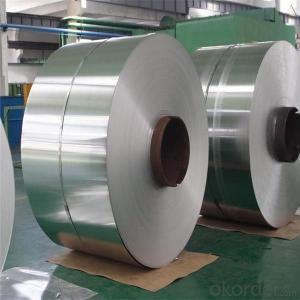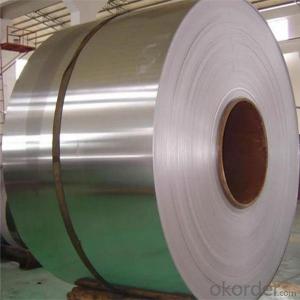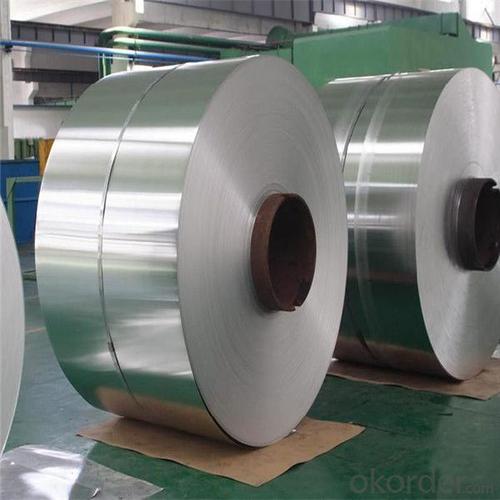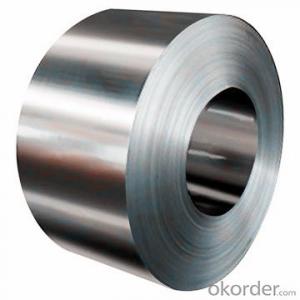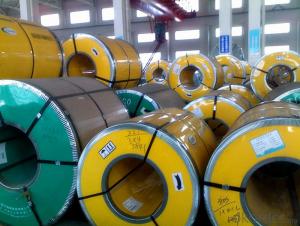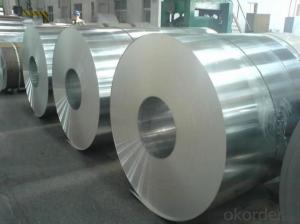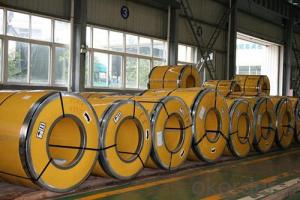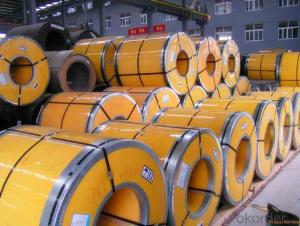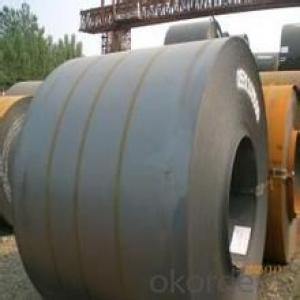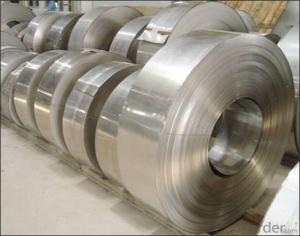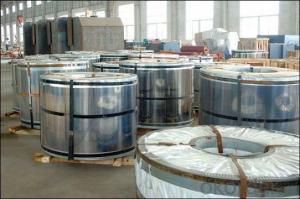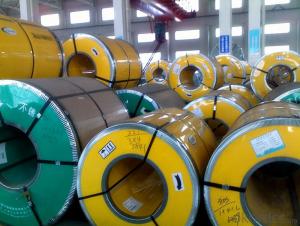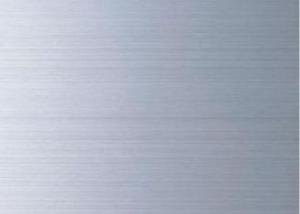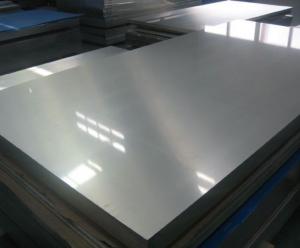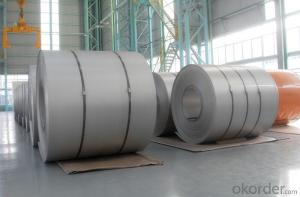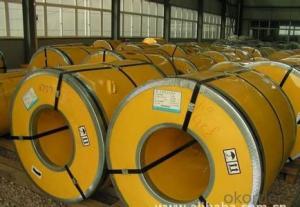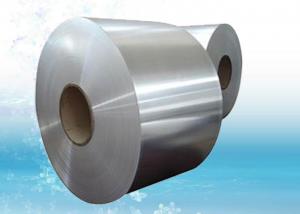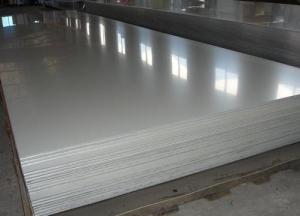SUS 321 Stainless Steel Coil on Stock Hot Rolled
- Loading Port:
- Shanghai
- Payment Terms:
- TT OR LC
- Min Order Qty:
- 2 m.t.
- Supply Capability:
- 100000 m.t./month
OKorder Service Pledge
OKorder Financial Service
You Might Also Like
Specification
Hot Rolled SUS 321 Stainless Steel Coil on Stock
Product Description
Specifications:
All Materials: 321
Thickness: 0.3-10mm
Width: 500-2000mm
Length: 1-6m or customized
Surface: 2B finished , slit edge
Picture show:
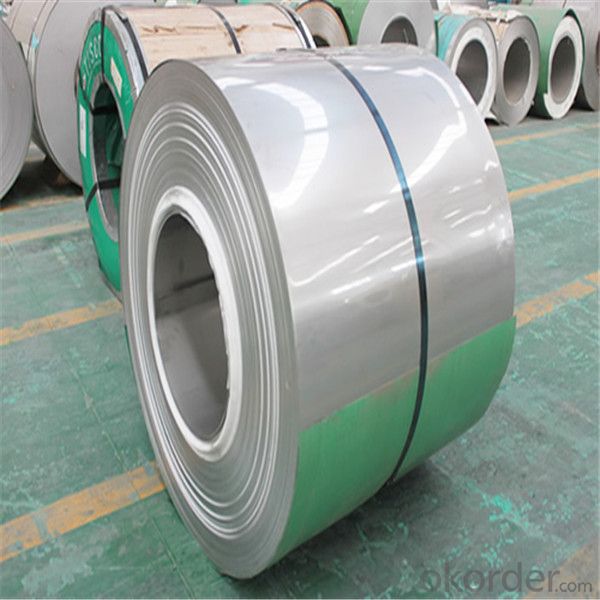
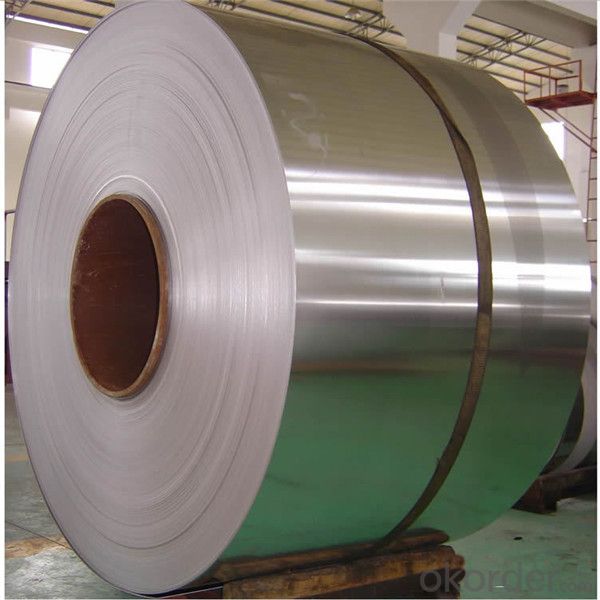
Applications:
Stainless Steel is widely used in Kitchenware, cutlery, household hardware, surgical instruments, major appliances, industrial equipment and as an automotive and aerospace structural alloy and construction material in large buildings. Storage tanks and tanker used to transport orange juice and other food are often made of stainless steel, because of its corrosion resistance and antibacterial properties. This also influences its use in commercial kitchens and food processing plants, as it can be steam-cleaned and sterilized and does not need paint or other surface finishes.
More Details:
Product name | Hot Rolled SUS 321 Stainless Steel Coil on Stock |
Standard | ASTM AISI JIS DIN EN SUS |
Place of Origin | Jiangsu of China (Mainland) |
Brand Name | TISCO |
Type | Coil |
Certification | ISO Certificate, Mill Test Certificate |
Application | Kitchenware, Tanks, Food Processing, cutlery, construction, household hardware, surgical instruments, major appliances, industrial equipment and as an automotive and aerospace structural alloy |
Technical treatment | Cold Rolled, Hot Rolled |
MOQ | 1 Metric Ton |
Terms of delivery | FOB, CFR, CIF |
Terms of Payment | L/C, T/T (30% desipot) |
Port of Loading | Shanghai or any port of China |
Packing | In bundles, packed with Water proof paper and wooden pallet. To be packed strongly avoid damage during transportation, and can be also according to the regulations and customer’s requests. Furthermore, products packages also are tagged clear on the outside for easy identification of the product and quality information. |
Time of delivery | Normally delivery within 7-10 days after recieve your 30% desipot or as your requirement |
Stock | Ready In stocks |
Packaging & Shipping
Packing info.
Standard export seaworthy packing (with waterproof paper, metal belt pack sheet,
then put them in wooden pallet, then put in container) or customized.
Products are packed and labeled according to the regulations and customer's request.
Grate car is taken to avoid any damage which might otherwise be caused during storage
or transportation. In addition, clear labels are tagged on the outside of the packages
for easy identification of the product I.D. and quality information.
20 ft - GP: 5.8m (Length) * 2.13m (Width) * 2.18m (Hight) ------ About 23MTS
40 ft - GP: 11.8m (Length) * 2.13m (Width) * 2.18m (Hight) ------ About 27MTS
40 ft - HG: 11.8m (Length) * 2.13m (Width) * 2.72m (Hight) ------ About 27MTS
Terms:
1) Delivery term: About 7-10 days after receiving the 30% deposit, or as soon aswe receive the repayment, we can arrange shipment right now.
2) Payment term: T/T, including the 30% deposit after signing the contract and the balance 70% after sending the B/L copy.
3) Quality assurance: Mill Test Certificate or the material certificate will be supplier
Our Services
Service
1) Transportation speed is quick
2) High quality , quantity is with preferential treatment
3) We can cut stainless steel sheet in any shapes
4) Famous stainless steel company in China and overseas.
5) Strong ability to supply
6) Branded stainless steel
7) More than 200 patterns
8) Bottom price
9) Reliable quality and service
10) Buyer's specifications accepted
11) Experienced R & D Department
FAQ
FAQ
Q:What kind of work does your company do?
A:Our company is a professional manufacturer.We mainly produces forged rollers,forged shafts,round bars,
casting iron pipe mould and various types of forging pieces fully in accordance with customers' requirement.
Q:What are the advantages of your company?
A: We have many professional technical personnel.And we have more competitive prices and better after-sales service than trading companies.
Q:How do you control the quality?
A:Our company is certificated to ISO9001:2008.We have many inspectors and every product will have been tested for 4-5 processes.
We welcome customers or the third party inspection agencies to come to our factory for inspection.
Q:What about your price?
A:Our price is very competitive because we are a factory.Please contact us if you are interested in our products.
Q:How long is your delivery time?
A:Different products have different delivery time.The products will be delivered as soon as possible on the basis
of the quality assurance.Usually the delivery time is within 7-10 days after we recieved your desipot.
- Q: Can stainless steel strips be used in agricultural applications?
- Yes, stainless steel strips can be used in agricultural applications. Stainless steel is known for its corrosion resistance, durability, and strength, making it suitable for various agricultural tasks. It is commonly used in the construction of agricultural buildings, such as barns, sheds, and storage facilities, to provide structural support and protection against weather elements. Stainless steel strips can also be used for fencing and gates, as they offer excellent resistance to rust and corrosion caused by moisture and chemicals commonly found in agricultural environments. Additionally, stainless steel strips can be used in the fabrication of agricultural equipment and machinery components, such as brackets, clamps, and connectors, due to their high strength and resistance to wear and tear. Overall, stainless steel strips are a versatile and reliable material choice for agricultural applications.
- Q: Can stainless steel strips be used in the manufacturing of kitchen appliances?
- Yes, stainless steel strips can be used in the manufacturing of kitchen appliances. Stainless steel is a popular choice for kitchen appliances due to its durability, resistance to corrosion, and ease of cleaning. Stainless steel strips can be utilized to create various components and surfaces in kitchen appliances, ensuring a sleek and modern look while providing excellent functionality.
- Q: Are stainless steel strips suitable for outdoor signage?
- Yes, stainless steel strips are suitable for outdoor signage. Stainless steel is highly resistant to corrosion, making it ideal for outdoor applications where durability is essential. It can withstand exposure to various weather conditions, including rain, snow, and UV rays, without deteriorating or losing its aesthetic appeal. Additionally, stainless steel strips provide a sleek and modern look that can enhance the visual impact of outdoor signage.
- Q: Are stainless steel strips available in different colors?
- Different colors are not available for stainless steel strips. Stainless steel is a metal alloy that is famous for its resistance to corrosion and durability. Its natural color is usually silver due to its composition. Nevertheless, if desired, stainless steel can be coated or painted in various colors. This is primarily done for decorative reasons, but it might impact the corrosion resistance and durability of the stainless steel.
- Q: Are 111 stainless steel strips suitable for architectural applications?
- Yes, 111 stainless steel strips can be suitable for architectural applications. Stainless steel is a popular material choice for architectural purposes due to its durability, corrosion resistance, and aesthetic appeal. The grade 111 stainless steel is a readily available and cost-effective option that can be used in various architectural applications such as wall cladding, roofing, handrails, and decorative elements. However, it is important to consider the specific requirements of the architectural project and consult with professionals to ensure that the chosen material meets the necessary standards and specifications.
- Q: What are the different types of stainless steel strips available?
- There are several different types of stainless steel strips available, including austenitic, ferritic, martensitic, and duplex stainless steel. Each type has its own unique properties and characteristics, making them suitable for various applications and industries.
- Q: How do you determine the corrosion resistance of a stainless steel strip?
- To determine the corrosion resistance of a stainless steel strip, several methods can be employed. One common technique is conducting a corrosion test, such as the salt spray test or the immersion test. In the salt spray test, the stainless steel strip is exposed to a saline solution, typically composed of sodium chloride, in a controlled environment. The strip is placed in a chamber where it is subjected to a continuous mist of the saline solution. The duration of the test can vary depending on the desired evaluation period, but it is often conducted for a minimum of 24 hours. After the test, the strip is inspected for any signs of corrosion, such as rust or pitting. The extent and severity of the corrosion can then be evaluated to determine the strip's corrosion resistance. Another method is the immersion test, where the stainless steel strip is submerged in a corrosive solution for a specific period. The solution used in this test can be tailored to simulate the specific corrosive environment the strip is expected to encounter in its intended application. Again, after the immersion period, the strip is examined for any signs of corrosion. Furthermore, electrochemical techniques can be employed to assess the corrosion resistance of a stainless steel strip. One such technique is the potentiodynamic polarization test, which involves subjecting the strip to a range of electrical potentials while monitoring the current flow. The resulting polarization curve can provide insights into the corrosion behavior of the strip, including its corrosion potential and corrosion rate. It is important to note that these tests should be conducted in accordance with relevant industry standards, such as ASTM (American Society for Testing and Materials) or ISO (International Organization for Standardization) specifications, to ensure accurate and consistent evaluation of the stainless steel strip's corrosion resistance. Additionally, it is essential to consider the specific alloy composition, surface finish, and any other factors that may influence the corrosion resistance of the strip when performing these tests.
- Q: Can stainless steel strips be used in petrochemical applications?
- Indeed, petrochemical applications do allow for the use of stainless steel strips. Renowned for its remarkable resistance to corrosion, stainless steel proves to be an appropriate material for environments subject to extensive chemical exposure, including petrochemical plants. By withstanding the deleterious effects of petrochemicals, stainless steel guarantees the equipment's durability and longevity. Moreover, its exceptional strength and heat resistance properties amplify its suitability for petrochemical applications. Hence, stainless steel strips find frequent employment in the fabrication of diverse petrochemical equipment, encompassing tanks, pipelines, heat exchangers, and reactors.
- Q: What is the hardness of stainless steel band 3/4?
- 1/2 hardness range: HV250 degrees to HV2903/4 hardness range: HV310 to HV370(HV:, Vivtorinox hardness)
- Q: What are the factors that affect the corrosion resistance of stainless steel strips?
- The factors that affect the corrosion resistance of stainless steel strips include the composition of the stainless steel alloy, the presence of impurities or contaminants, the surface finish and condition of the strips, exposure to corrosive environments such as moisture, acids, or saltwater, and the temperature at which the stainless steel is used. Additionally, factors such as mechanical stress, pH levels, and the presence of other metals or materials in contact with the stainless steel can also impact its corrosion resistance.
Send your message to us
SUS 321 Stainless Steel Coil on Stock Hot Rolled
- Loading Port:
- Shanghai
- Payment Terms:
- TT OR LC
- Min Order Qty:
- 2 m.t.
- Supply Capability:
- 100000 m.t./month
OKorder Service Pledge
OKorder Financial Service
Similar products
Hot products
Hot Searches
Related keywords
